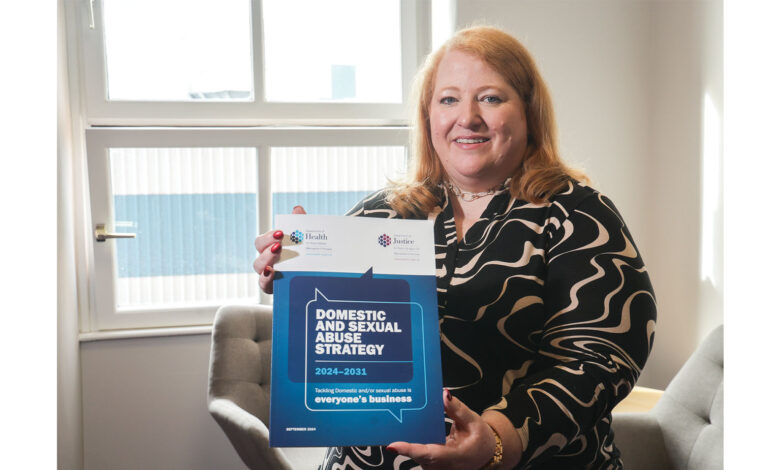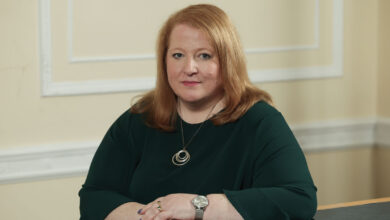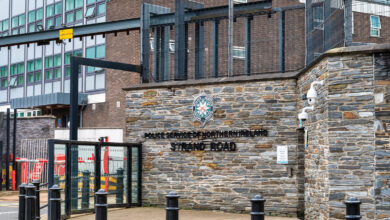New strategy to tackle domestic and sexual abuse

On average, the PSNI is made aware of a domestic abuse incident every 16 minutes, and sexual offence every two hours. In response, the Executive has published a new seven-year cross-departmental strategy, alongside a three-year action plan.
In late September 2024, Minister of Justice, Naomi Long MLA, and Minister of Health, Mike Nesbitt MLA jointly launched Domestic and Sexual Abuse Strategy 2024-2031.
In their foreword to the strategy, the lead ministers referenced the collaboration with Department for Communities, the Department of Education, and the Executive Office, as well as voluntary and community sector stakeholders.
“Partnership is a key thread running through this Strategy,” they wrote, adding: “We are committed to create a society in Northern Ireland where domestic and sexual abuse are not tolerated, where victims receive the support they need and where those responsible are held to account.”
Throughout the document, the contribution made by stakeholders and those with lived experience of domestic and sexual abuse is acknowledged as having informed the strategy. Furthermore, it emphasises that a whole society approach is required to tackle domestic and/or sexual abuse.
While aligning with the Executive’s Strategic Framework to End Violence against Women and Girls, the new strategy is gender inclusive and recognises that “domestic and sexual abuse transcends boundaries of gender, age, sexual orientation, and ethnicity”. Fundamentally, the strategy “recognises that anyone can be a victim”.
For Northern Ireland, the strategy envisions a Northern Ireland in which:
- domestic and/or sexual violence is not tolerated, and everyone lives safe and free from fear;
- domestic and/or sexual abuse “is everyone’s business”, where partnership and collaboration create lasting change; and
- the voices of victims, including children and young people, inform decision-making.
Establishing a strategic direction, five pillars provide a basis for a series of action plans over the strategy’s lifetime.
- Partnership: Driving change through “joint commitment, leadership and partnership working”.
- Prevention: Preventing domestic and/or sexual abuse through early intervention; challenging attitudes and behaviours that engender it.
- Children and young people: Alongside prevention, ensuring that children/young people are seen and heard, and can access support and services to help recovery as per their specific needs.
- Support and provision: Ensuring that all victims can access “tailored, responsive, and specialised support and provision” to recover and rebuild.
- Justice: Ensuring effective justice responses, supporting victims, while holding those guilty of abuse to account at the soonest opportunity.
Action Plan
An associated – and initial – three-year action plan was published online with actions under each of the five pillars above ranging in timeframe between one and three years. Many of the actions, the Action Plan notes, will require additional resources, including funding.
However, less than half of these 55 actions are costed, with the Action Plan explaining that “initial scoping and preparatory work will need to be progressed in order to identify reliable resource implications”. As such, the Action Plan caveats that such actions “may only be delivered if funding Is secured or implemented at a pace that funding permits”.
The initial plan is set to be reviewed at midway and endpoints of its lifespan, with the intention of informing subsequent action plans.
The Department of Justice (38) is the lead agency associated with most actions, followed by the Department of Health (25), and the Executive Office (eight). Other lead agencies include the PSNI, the Public Prosecution Service, the Northern Ireland Prison Service, the Housing Executive, and Victim Support NI.
The desired outcomes of the Action Plan for each pillar is as follows:
- Partnership: A coordinated response to domestic and/or sexual abuse that is informed by victims and community engagement.
- Prevention: Informing the public about the different types of domestic and/or sexual abuse and its impact on victims including children and young people, to identify abuse and respond earlier.
- Children and young people: Increasing the knowledge and skills of children and young people, and of supporting adults in their life, about forming healthy relationships, helping to prevent domestic and/or sexual abuse. Supporting children and young people to feel safe regardless of need, guide them into services quickly, and access safe accommodation-based services. Instil confidence in children and young people to report abuse, while reducing barriers to participation in the justice system, and ensuring effective justice responses.
- Support and provision: Ensuring that victims feel safe regardless of need and are guided into services quickly, while ensuring that all victims of abuse can access safe accommodation-based services.
- Justice: Ensuring that victims feel confident to report abuse, while reducing barriers to participation in the justice system, and ensuring effective justice responses while holding individuals accountable for abusive behaviour and supporting their change, reducing the risk of harm and enhancing victim safety.
Commentary
Launched at NSPCC’s north Belfast headquarters, Long emphasised the pervasive experience of sexual abuse across demographic metrics and committed to the creation of a society in which domestic and sexual abuse “are not tolerated”, victims are adequately supported, and those responsible are held accountable.
“This strategy is our sincere attempt to deliver on that aim, so that no one has to live in fear of abuse,” she said.
Asserting that every person has the right to live free from domestic and sexual abuse, Nesbitt said: “We are building on what we know works, on evidence-based practice,” adding: “Partnership is a key thread running through this strategy.”
NSPCC Northern Ireland welcomed the launch, especially pillar three of the strategy which focuses on children and young people. Its Assistant Director, Bronagh Muldoon commented: “The strategy is an important milestone and provides a focus on key areas that require cross-government action.
“NSPCC Northern Ireland is committed to working with government and our partners to prevent, recognise and respond to child sexual abuse and domestic abuse in Northern Ireland.”
Simultaneously, the two ministers have also launched a Children’s Sexual Offences Legal Advisers (SOLA) scheme, providing free legal advice to children and young people impacted by sexual crime. In addition, the scheme provides a small grant to help support the work of the community and voluntary sector.
Strategy definitions
Definition of domestic abuse
Domestic abuse is threatening, controlling, coercive behaviour, violence, or abuse (psychological, virtual, physical, verbal, sexual, financial, or emotional) inflicted on anyone by a current or former intimate partner or family member.
Definition of sexual abuse
Sexual abuse is any behaviour (physical, psychological, verbal, virtual/online) perceived to be of a sexual nature which is controlling, coercive, exploitative, harmful, or unwanted that is inflicted on anyone.





